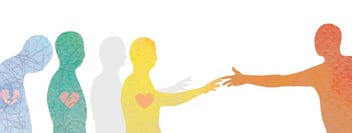A New Year’s Resolution: Stop Damaging Your Precious and Remarkable Brain!
- Home
- Blog

This week, I’d like to ask you a simple question: How are those New Year resolutions going for you so far? Just days into the start of 2018, you may feel like you are still going strong. But if you are more like countless individuals I’ve helped over the years, you may feel as though you’re still on track, but fear that before too long your resolve will slip away. Many well-intentioned people begin the New Year firmly committed to a month-long diet—or more commonly, a month-long period of abstinence from drinking alcohol (or using recreational drugs). While this is a great idea, the strategy begs the question: What happens after the month ends? “How will I possibly be able to continue to execute on this commitment over a longer period of time?” All too often, we simply fall back into old habits. We become Self-Saboteurs once again. To maintain your resolve (to remain abstinent), perhaps what you need most is a deep-dive into the facts. Simply put, alcohol binges and recreational drug use not only exert profoundly negative health effects on your brain in the long term—they also play a major role in “kindling” (physically worsening) mood disorders when there is an underlying predisposition toward bipolar disorder or major depression.
So let’s return to that simple question: If your New Year resolution around alcohol or drug use is slipping, I encourage you to keep reading to fully understand the science behind why this year, of all years, your 30 days of abstinence should extend much further.
Drug and/or alcohol abuse exert profound negative effects on brain function
If you are using alcohol or drugs to manage your emotions or anxieties, there are better ways for you to cope with your emotional pain that will offer you hope, and not damage your brain. Let’s talk about them. To begin with, if you are abusing substances, it is important that you seek help immediately, and not try to solve your problems all by yourself. Your brain is one of your most prized assets, and it is a relatively fragile organ. Encased inside of its protective bony skull, the brain consumes up to 20% of the body’s energy production carrying out an extraordinary array of functions.[i] Drug and/or alcohol abuse exert profound negative effects on brain function. Recent evidence on marijuana use, for example shows changes in brain structure and reduced attention, memory and executive functions that may become irreversible over time.[ii] [iii]
Alcohol abuse has been shown to have a role in “kindling” mood disorders when there is an underlying predisposition toward bipolar disorder or major depression.[iv] [v] The “kindling” means that the brain becomes increasingly responsive to the same stimulation and this increases the brain’s reactivity, which can bring on or worsen a major mood disorder, and can cause long term changes in the brain.[vi] And withdrawal from alcohol can actually cause changes in how your DNA expresses itself, resulting in a higher likelihood of anxiety, which then leads to further alcohol use and an even higher risk of depression and bipolar disorder.
The first goal of treatment is abstinence,[vii] to protect the brain from structural damage and kindling-related changes, and to end a destructive downward spiral. The next goal is to prevent a relapse.[viii] Treatment is available at many levels including Alcoholics Anonymous, intensive outpatient, day treatment, and inpatient rehabilitation; depending upon the severity of your condition. Through a combination of emotional support, education, and family involvement when appropriate, you will develop and maintain abstinence and engage in relapse-prevention strategies. You will learn to identify the “slippery situations” – life contexts and experiences which are more likely to trigger your use – and learn ways to avoid or manage these slippery situations without using.[ix]
Underlying mood and anxiety disorders will be identified and treated with medications, as sometimes the use of alcohol and drugs is an attempt to self-medicate these conditions.[x] [xi] These substances may initially make you feel better, but over time will degrade the underlying brain functions that regulate your mood and anxiety, thereby worsening these symptoms. Genetic testing may help guide the selection of medication that will be most effective.
During the period of abstinence and relapse-prevention you can further assist your recovery through a nutritional and exercise regimen that is simple in principle yet difficult to enact and sustain.[xii] A diet rich in lean proteins, fruits and vegetables will stabilize your blood sugar and insulin levels, help you lose weight, and reduce cravings for carbohydrates.[xiii] Cardiovascular fitness exercise has been recently shown to promote new brain cell growth in a critical region of the brain – the hippocampus – where emotion regulation and aspects of memory function take place.[xiv] Exercise can also improve connections between brain cells (neural plasticity) that have been disrupted, further assisting in your recovery.[xv] [xvi]
Recovering from an addiction is a lifelong process, and frequently requires ongoing medication to assist in treating underlying mood or anxiety disorders, without which relapse will become more likely. In addition, finding a twelve step program[xvii] with a peer group with whom you can identify can be invaluable. Regular attendance[xviii] can provide additional emotional support, and there are Al-Anon and family therapy programs that can be attended by your loved ones to assist in your recovery.[xix] Prompt and ongoing treatment is critical to restoring and preserving the health of your brain, and will help to prevent the development of permanent brain damage. It is far better to protect and nourish your brain now, well before you begin to have the kinds of cognitive problems that will develop over time! In addition, the earlier you receive treatment, the more likely you are to preserve and protect the love relationships in your life. Just as substance abuse can damage your brain, it can also damage trust, commitment, and sustained caring from your loved ones.[xx]
Questions to Answer
Please take out a notebook or clean sheet of paper and write down your answers to the following questions.
Step 1: Is your life in turmoil? If so, how may the use of alcohol or drugs be worsening your situation? Please be as honest with yourself as possible, here.
Step 2: Are there times where you have significant difficulty coping or functioning? Please describe. At these times do you use alcohol or drugs to feel better? If so please write down the pattern of behavior, including any situations (triggers) that predispose you to using.
Step 3: Are there important relationships which are deteriorating? If so, write down the name of each significant other, what is happening between you and them, and how they feel about your alcohol or drug use.
Step 4: Are you feeling hopeless? Are these feelings worsened when you are under the influence? What do you feel like the day after, and is there any impairment in your functioning? Please describe.
Step 5: Is your pattern of substance use escalating? If so, has your performance at work declined? Are you feeling increasingly isolated?
Step 6: Are you using substances to feel less anxious or depressed? Are they comforting or soothing in some fashion? Is there a pattern whereby the more stress you feel, the more you use? Is this working for you, or making matters worse over time?
If you have answered “Yes” in one or more of these Steps, then it is important that you seek out professional help as soon as possible, to avoid brain damage, and further harm to those important love relationships.


